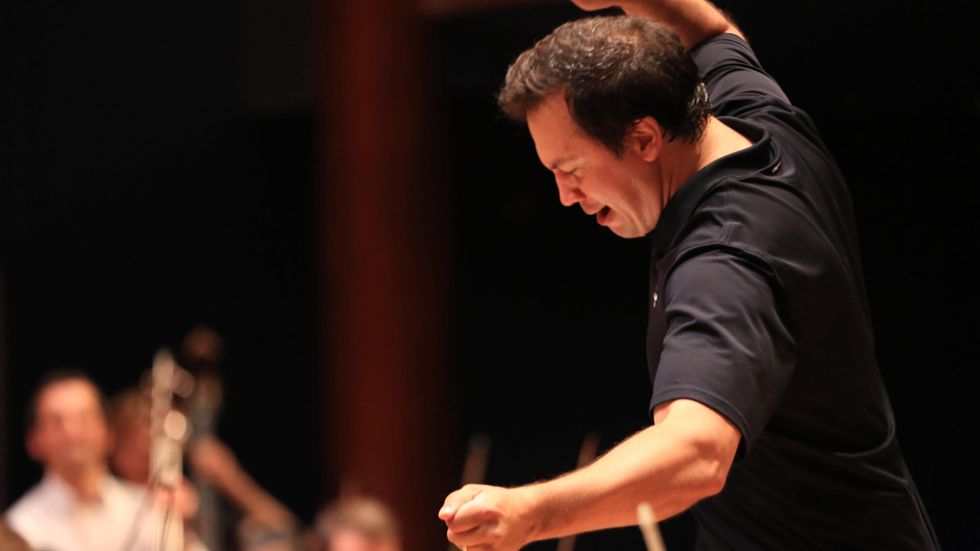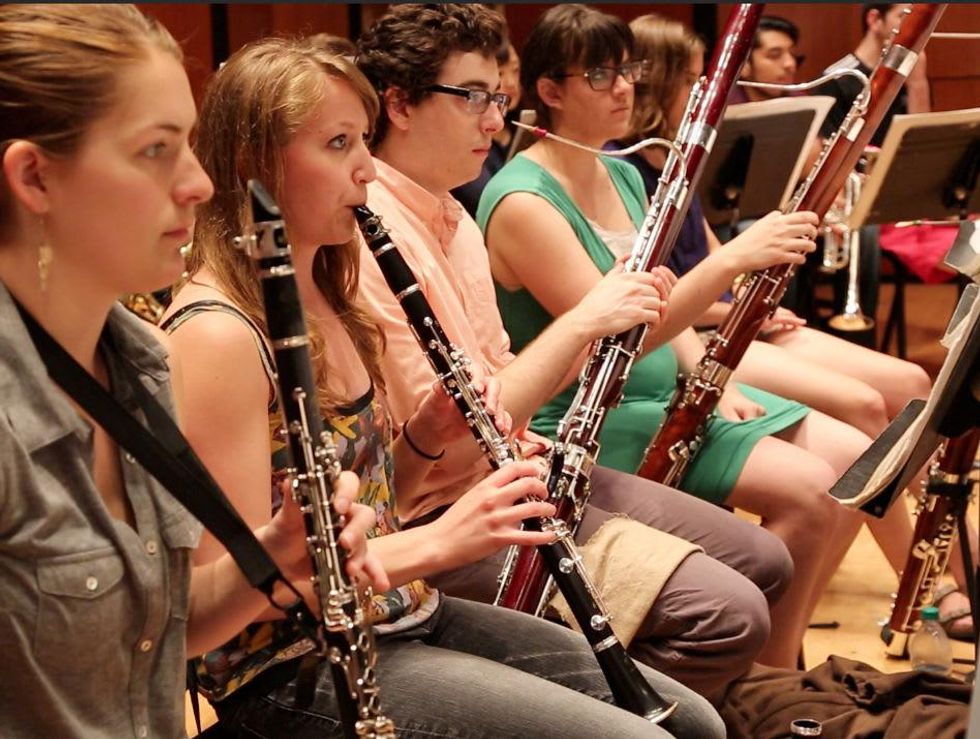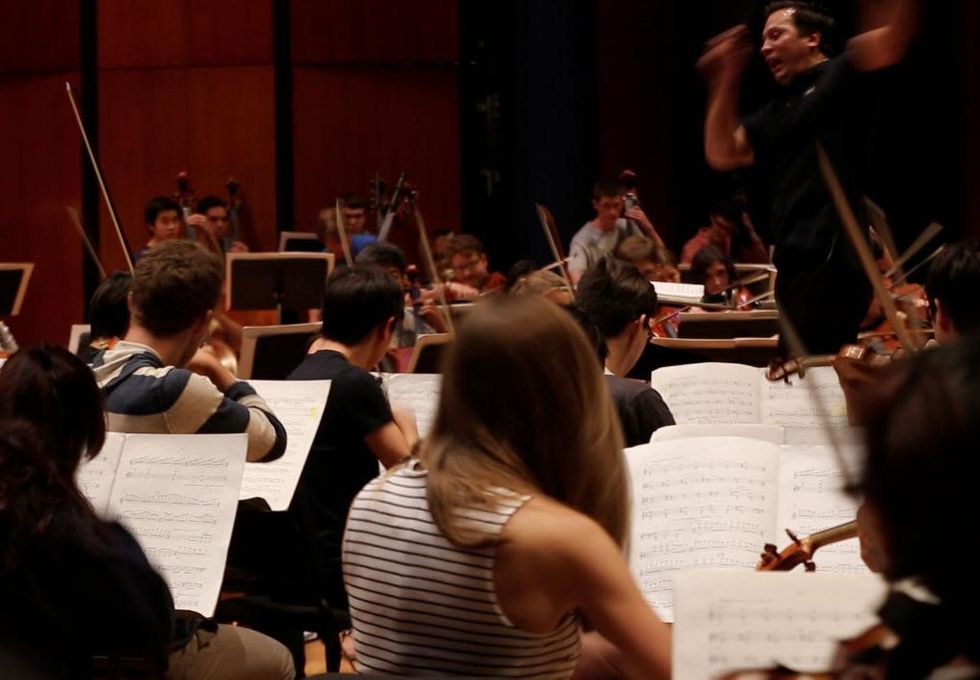CultureMap Video
Miraculous music: Scandalous masterpiece set in post-apocalyptic brothel shakes up classical world
I'm always in the mood for Chinese. Who isn't?
My friends howled at my expense. I was humiliated. But looking back at my misguided assertion, I can't help but laugh at myself for this innocent comment that revealed my unfamiliarity with a scandalous classical music composition, one whose story made me blush. Prostitutes? Seductive dances? A brothel in a post-apocalyptic concrete jungle?
That's not what I thought when my friends asked, "Do you want to go to Miraculous Mandarin?"
In my defense, doesn't Béla Bartók's masterpiece sound like a trendy Asian restaurant?
In my defense, doesn't Béla Bartók's masterpiece sound like a trendy Asian restaurant? Perhaps like one of those self-proclaimed Mongolian barbecue fast-food joints in which diners pile a bowl with raw meats and veggies messily displayed in a long buffet line after which some dude in a racist outfit stir-fries them in a huge round grill? Tip the cooks and they ring a gong of some sort to show their appreciation.
It was one of those teenage road trips. In Chicago for a music conference, we packed eight people into an expensive hotel room somewhere on the Magnificent Mile. It just so happened that there were rush tickets available — read that: nosebleed seats — to a Chicago Symphony Orchestra performance that included Bartók's Suite from the Miraculous Mandarin and an incomprehensible new work by Pierre Boulez, who served as the evening's conductor.
I had no idea that classical music could be this way.
Listening to the cacophony of sounds and learning about the sadistic storyline introduced me to a whole new music genre that escaped the refinement of Mozart, the seriousness of Beethoven, the lushness of Brahms, the sensuality of Debussy, the transcendentalism of Mahler and even the virility of Shostakovich. Although the term Brutalism is reserved to describe post-World War II architecture — think of the Alley Theatre as an example (I'm in the coterie who thinks the building is an iconic hideous eyesore) — it's perhaps fitting to consider Bartok's post-World War I pantomime ballet in the same crude aesthetic.
With Wichita Symphony Orchestra music director Daniel Hege on the podium, Saturday's Texas Music Festival concert at the Moores Opera House consists of Bartók's Suite from The Miraculous Mandarin alongside other rarely heard 20th-century masterpieces, including Britten's Sinfonia da Requiem and Nielsen's Symphony No. 4.
The Beauty and the Beast
"The piece is beautiful in a strange, macabre sense," Hege says. "We have to view this in the context of World War I, when the world had not seen atrocities of this level. When people are witness to that kind of destruction that happened with human life and property, they look for redemption that can be found out of evil. I can't say that this was Bartók's intention, but when one is trying to make sense out of the piece, we come to this conclusion."
The beastly premise is sourced from a 1916 work of the same name by Hungarian writer Melchior Lengyel. The plot unfolds in a chaotic urban wasteland where three tramps are short on cash. They sequester a girl and force her to pose behind a window to lure men into a trap. The girl uses her seductive powers and engages in what's marked in the score as "decoy games." Soon two men, an old rake and a shy young man, fall for the ruse, but the victims don't have any money.
"The piece is beautiful in a strange, macabre sense. We have to view this in the context of World War I, when the world had not seen atrocities of this level."
The third man is the Miraculous Mandarin, who, despite the savage attacks by the tramps — the ladies attempt to suffocate him with pillows, they stab him three times and they hang him from a hook — just won't die. That's until the girl succumbs to his advances. When they embrace each other, the Mandarin finally is laid to rest.
"The Mandarin has a special, deep interest in the girl," Hege adds. "He's filled with lust, but there's something else there, perhaps sinister — it's a mixture of lots of emotions."
The girl is represented by a series of cadenzas in the clarinet, a partiture that clarinetists study for years; it's one of the most exposed parts of the orchestral repertoire for this particular woodwind instrument. Rebecca Tobin, a recent graduate of the Eastman School of Music in Rochester, N.Y., who's staying in Houston to begin her master's degree at the Shepherd School of Music at Rice University, is sitting principal for the performance of the suite.
"The cadenzas are complicated because they include a lot of tempo changes and tiny nuances," Tobin says. "Parts of the cadenzas are in duet with the second and third clarinet players, so there's a lot of collaboration going on. You have to know the music very well before you can play it successfully in an orchestral setting."
Tobin explains that one of the virtues of the clarinet is its ability to play softly.
"All these cadenzas start off really quietly, the kind of music where you have to lean in and ask yourself, 'what's going on?'," she says. "That character mirrors how the girl attracts the men inside — subtly at first, then more aggressively."
Although at points the music may sound abstract, particularly to listeners who may not know the narrative, Bartók, in keeping with his compositional style, draws from the rich tradition of Hungarian folk songs and modal scales, evident in the visceral dances that create the texture of a wild, raucous and lewd bacchanal.
As if the Danse générale in Ravel's Daphnis et Chloé were injected with high-octane juice, blown up with radioactive explosives and journeyed to the dark side of the force.
And like my original concept of the Miraculous Mandarin, Bartók's score calls for a gong. Well, it's a tam tam.
Close enough.
___
The Texas Music Festival presents "Daniel Hege conducts Miraculous Mandarin" on Saturday, 7:30 p.m., at the University of Houston's Moores Opera House. The evening begins at 6:30 p.m. with pre-concert entertainment followed by a pre-concert lecture from 6:40 to 7:10 p.m. The performance starts at 7:30 p.m. Tickets are $15 for adults, $10 for students and seniors, and $8 for groups of 10 or more. Tickets may be purchased online or by calling 713-743-3313.




